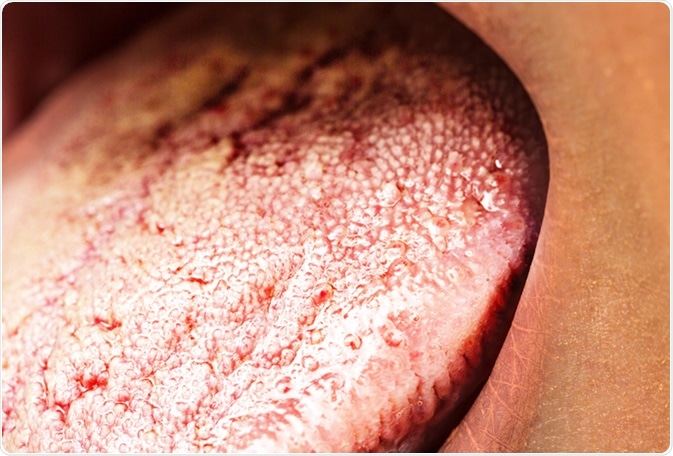The appropriate treatment for oral thrush (Candidiasis) will depend on the specific patient case and the likely cause of the condition.
Any likely causes should be established during the diagnostic process so that their likelihood can be minimized in the future to prevent recurrences of the condition. Treatment with antifungal medications is the most common solution, and there are many different forms available. Non-pharmacological management techniques can also help to assist treatment and prevent recurrence.
Each of these areas in the treatment of oral thrush will be discussed in more detail below.

Addressing the Cause
It is important for the most probable cause of the oral thrush to be deduced during the diagnostic process, as this will have an impact on the treatment decisions.
If the use of a certain medication (e.g. antibiotics or inhaled corticosteroids) is like to be involved, there may be a need to alter the use or administration of the medication. For example, a patient with oral thrush who is taking an inhaled corticosteroid may be advised to use a spacer when taking the medication and rinse the mouth after each use, which can help to prevent oral thrush.
For patients who have dentures, a check-up with their dentist should be recommended to check that the dentures a well fitted. This is because poorly fitted dentures can sometimes cause oral thrush and should, therefore, be avoided.
Antifungal Medications
Oral thrush is usually treated with antifungal medications, which help to control the growth of Candida in the mouth.
There are various forms of antifungal medications, including gels and liquids, that can be applied topically to the affected area. Oral antifungal tablets or capsules to be swallowed are also sometimes recommended, although these are less commonly prescribed as they are also associated with systemic effects on the rest of the body.
Topical formulation usually needs to be applied several times a day for 1-2 weeks to eradicate the fungal infection most effective, whereas once daily dosing is usually required for oral medications.
Antifungal medications may occasionally cause some side effect, especially for the oral medications with a systemic effect. These may include:
- Nausea
- Vomiting and diarrhea
- Abdominal pain
- Bloating
If the symptoms persist for more than ten days with antifungal treatment or the infection recurs, it is recommended for the patient to seek further medical advice.
Prophylactic antifungal medications are also sometimes recommended on an ongoing basis for patients with a compromised immune system and who are, therefore, more likely to get oral thrush. This includes patients who have HIV and/or are taking immunosuppressant medication.
Non-Pharmacological Management
In addition to antifungal treatment, it is also important to maintain good oral hygiene to manage and prevent oral thrush. Patients should be advised to:
- Brush teeth twice a day and floss daily
- Rinse mouth after meals or using inhaled medications
- Ensure that any dentures are well-fitted in the mouth
- Remove any dentures at night and clean them regularly
- Consume a healthy diet with low intake of sugary foods
- Maintain adequate fluid intake to keep the mouth moist
- Avoid smoking
Each of these points is important for good oral hygiene and reducing the risk of oral thrush recurrence. Therefore, they should be recommended alongside other treatment methods, such as antifungal medications, and continued after the infection has cleared.
Reviewed by Afsaneh Khetrapal BSc (Hons)
References
- http://www.nhs.uk/Conditions/Oral-thrush—adults/Pages/Introduction.aspx
- http://www.nhs.uk/conditions/Antifungal-drugs/Pages/Introduction.aspx
- https://www.myvmc.com/diseases/oral-thrush-monoliasis-oral-candidiasis-oc/
- https://www.ncbi.nlm.nih.gov/pmc/articles/PMC3087208/
Further Reading
- All Oral Candidiasis Content
- Oral Candidiasis (Oral Thrush)
- Oral Candidiasis Causes
- Oral Thrush in Adults
Last Updated: Aug 23, 2018

Written by
Yolanda Smith
Yolanda graduated with a Bachelor of Pharmacy at the University of South Australia and has experience working in both Australia and Italy. She is passionate about how medicine, diet and lifestyle affect our health and enjoys helping people understand this. In her spare time she loves to explore the world and learn about new cultures and languages.
Source: Read Full Article






